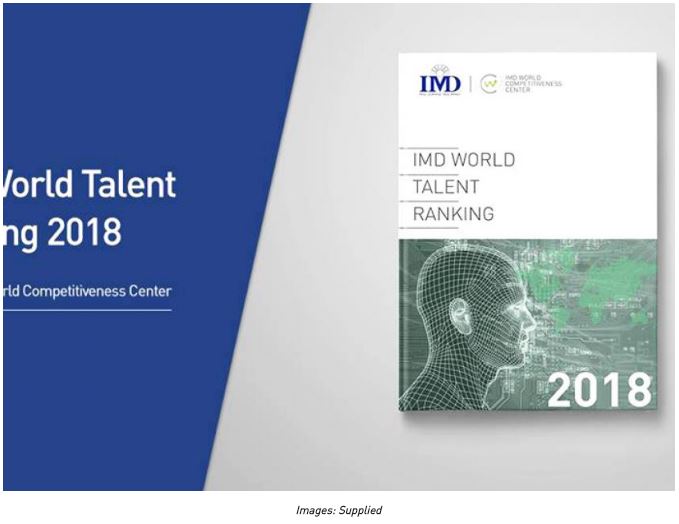Singapore, Hong Kong lead talent competitiveness in Asia
The two city-states of Singapore and Hong Kong, a Special Administrative Region in China, lead the IMD World Talent Ranking 2018 in Asia Pacific, while Malaysia has made significant improvements in developing a domestic talent pool.
The IMD World Talent Ranking 2018 ranked countries based on three factors – workplace training, education, and language skills. Evaluating the capability of 63 countries in developing, attracting and retaining talent, the report shows that countries successful in talent competitiveness usually share high levels of investment in education and quality of life. Myanmar is not included in the ranking.
Singapore (13th), Hong Kong SAR (18th) and Malaysia (22nd) achieve the best placements in terms of talent competitiveness. Compared to last year, Singapore keeps the same position in the ranking, Hong Kong declines by six places and Malaysia moves up by the same number. The two cities continue to excel in tapping into the international talent pool to sustain their top-tier talent pool, but lag behind in terms of public investment in education. Conversely, Malaysia’s progress in the ranking is rooted in investments in education to develop its homegrown skilled workforce, in addition to improved perceptions of the quality of the talent pool available in the country.
In East Asia, Taiwan (27th) prioritises the attraction and retention of talent, Japan improves (29th) due to the availability of skilled labour and the effectiveness of its education system and South Korea advances (33rd) partly due to increased state expenditure on education and improvements in the implementation of apprenticeships programmes and employee training.
China (39th) places in the second half of the ranking because of its difficulties in attracting foreign skilled workers paired with a level of public expenditure in education that is below the average of other advanced economies.

Source: IMD World Competitiveness Center (2018)
In the ASEAN region, Indonesia (45th) and the Philippines (55th) show the opposite trend between 2017 and 2018. Indonesia advances by two places, following improvements in several indicators related to investment in education. In contrast, the Philippines experiences a ten-position decline from last year, due to a sharp drop in the Readiness factor (37th, from 11th in 2017). This change is driven by a marked deterioration in every criterion related to the business community’s perceptions of the quality of education as well as a decline in labour force quality. Meanwhile, Thailand (42nd) also falls in the second half of the ranking, partly due to its performance in the readiness of domestic talent.
Investment in education
Globally, Switzerland in first and Denmark in second, firmly lead the IMD World Talent Ranking 2018 for the fifth year in a row, followed by Norway, Austria and the Netherlands. Norway joins the top three, advancing four places up from last year, thanks to an improvement in public expenditure on education and the readiness of its talent pool. Canada (6th), Finland (7th), Sweden (8th), Luxembourg (9th), and Germany (10th) complete the top 10.
The Slovak Republic (59th), Colombia (60th), Mexico (61st), Mongolia (62nd), and Venezuela (63rd) are the last countries in the ranking.
“Since 2014, the Talent Ranking assesses how the 63 economies we study develop, attract and retain highly-skilled professionals. Cultivating a skilled and educated workforce is crucial to strengthening competitiveness and achieving long-term prosperity, particularly in the current dynamic landscape where artificial intelligence, robotics and other new technologies constantly redefine the challenges that governments, businesses and society in general will have to face in the future,” Arturo Bris, Director of the IMD World Competitiveness Centre, said.
“This year the most successful countries in talent competitiveness are mainly European, mid-size economies. Moreover, these countries share high levels of investment in education and quality of life,” he added.
This year the most successful countries in talent competitiveness are mainly European, mid-size economies. Moreover, these countries share high levels of investment in education and quality of life.
Overall picture
Including Switzerland and Denmark, several European countries fall within the 25 most competitive with respect to talent. Belgium (11th), Cyprus (15th), Portugal (17th), Ireland (21st), United Kingdom (23rd), and France (25th) complete this list.With the exception of Estonia (28th), Slovenia (30th), and Latvia (33rd), Eastern European countries generally place in the lower part of the ranking. For instance, Slovak Republic (59th), Bulgaria (57th), and Romania (56th) underperform in attracting highly skilled workers from abroad and they also face problems in retaining their locally-grown talent.Canada (6th) is the only non-European country in the top ten, rising from 11th place, lifted by an improvement in the quality of its talent pool. The USA (12th) also moves up with respect to last year showing advancements in all three talent factors.
At the bottom of the ranking are several Latin American countries. These economies are struggling to develop and retain talent. Venezuela (63rd), Mexico (61st), Colombia (60th) and Brazil (58th) all share issues related to brain drain, matched by a relatively low level of investment in education.
In the Pacific area, Australia (14th) and New Zealand (20th) confirm their role as talent-appealing hubs. Both countries show high levels of readiness in their talent pool and offer attractive quality of life for international professional
Source: https://www.mmtimes.com/news/singapore-hong-kong-lead-talent-competitiveness-asia.html


 Thailand
Thailand




